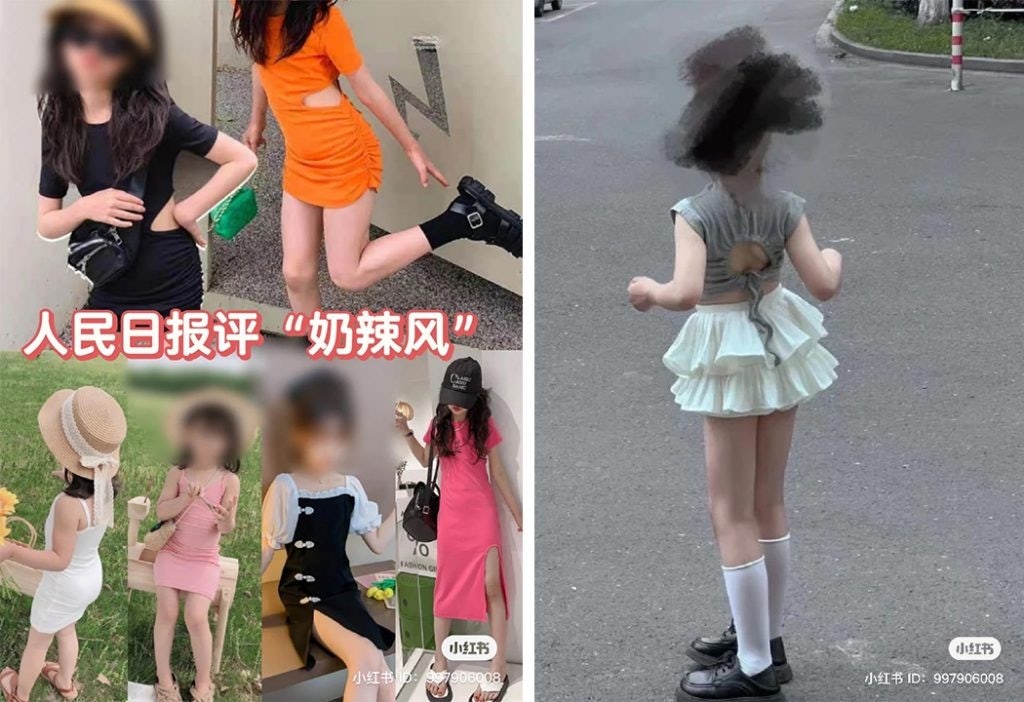What happened
“Spicy milk style” might sound like a strange hotpot broth or an internet challenge gone wrong — but it’s actually worse. In China, the term (known as 奶辣风) refers to parents dressing their toddlers in what may be considered more risqué “adult apparel,” such as tight skirts, tube tops, backless or strapless dresses, and high heels.
Last week, the spicy milk trend went viral on Weibo after a state-owned media account reported that a teacher in Beijing had noticed one of her elementary school students wearing a low-cut, backless dress to class. When the teacher called the child’s parents for a change of clothes, the parents refused. The outlet also cited examples of other parents posting photos of their children in sexualized poses and revealing clothing, calling it “soft pornography.”

Netizens were quick to voice their concerns. On Weibo, the hashtag related to the aforementioned incident (#儿童穿着奶辣风老师提醒更换家长拒绝) has received over 130 million views since July 17.
“With so many perverts and pedophiles nowadays, are parents and businesses trying to make it more convenient for them?” reads a comment with 2,900 likes.
The Jing Take
Globally, fashion for younger consumers has become more stylish and, arguably, mature, thanks to social media; just look at yearbook photos of kids in the 2000s versus now. However, this trend doesn’t involve teens and 20-somethings on TikTok; it involves kids in the wee single digits.
KOL parents and kid influencers have long been popular on Chinese social media. Accounts like @superRenee (75,000 followers) and @和小丢在一起的每一天 (2.5 million followers) that post daily outfits, brand recommendation, and parenting advice have a big sway on millennial Chinese moms. In fact, parents born after the 1990s are reportedly more willing to purchase matching parent-child outfits (亲子装) than any other generation, helping the market grow to an estimated 7.79 billion RMB (1.08 billion) in 2022.
However, this is a case of parents taking the dress-up trend too far. As state-owned media People’s Daily points out in a Weibo post, sexy styles are becoming more prevalent in the children’s apparel market and several e-commerce platforms have featured child models wearing skin-baring clothes in their product promotions.
“Given the ‘conspiracy’ between merchants and parents, children have become ‘tools’ to attract traffic — the more revealing and contrasting the clothes, the easier it is to attract attention. The question is, what does the child get out of it?” the post states.

While some netizens have defended the trend on grounds of personal choice, China Daily argues that “freedom of dress is by no means unlimited freedom, and children's clothing is not small adult clothing… Childlike innocence should not be kidnapped by adult aesthetics.”
In the past, brands have gotten in trouble for their off-color childrenswear designs or inappropriate use of child models. In 2022, Balenciaga was blasted after publishing ads showing children holding teddy bears in bondage gear, while Chinese fashion label JNBY was ordered to pull a kid’s dress with offensive text off its shelves, which read, “I’m afraid, I want them to stop, I don’t want to land. No!!!”

As more luxury brands like Louis Vuitton and Billionaire Boys Club expand into childrenswear, it should go without saying that “sexy” and “children” should not be used in the same sentence.
The Jing Take reports on a piece of the leading news and presents our editorial team’s analysis of the key implications for the luxury industry. In the recurring column, we analyze everything from product drops and mergers to heated debate sprouting on Chinese social media.


